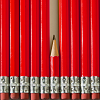There are 23 NRICH Mathematical resources connected to Combining probabilities, you may find related items under Probability.
Broad Topics > Probability > Combining probabilitiesImagine flipping a coin a number of times. Can you work out the probability you will get a head on at least one of the flips?



If everyone in your class picked a number from 1 to 225, do you think any two people would pick the same number?



Here are two games you can play. Which offers the better chance of winning?



After transferring balls back and forth between two bags the probability of selecting a green ball from bag 2 is 3/5. How many green balls were in bag 2 at the outset?



It is believed that weaker snooker players have a better chance of winning matches over eleven frames (i.e. first to win 6 frames) than they do over fifteen frames. Is this true?



Before a knockout tournament with 2^n players I pick two players. What is the probability that they have to play against each other at some point in the tournament?



How can we find out answers to questions like this if people often lie?




These strange dice are rolled. What is the probability that the sum obtained is an odd number?



"Statins cut the risks of heart attacks and strokes by 40%"
Should the Professor take statins? Can you help him decide?



Newspapers said that eating a bacon sandwich every day raises the risk of bowel cancer by 20%. Should you be concerned?



Can you design a bingo board that gives you the best chance of winning?



Can you devise a fair scoring system when dice land edge-up or corner-up?



Investigate the molecular masses in this sequence of molecules and deduce which molecule has been analysed in the mass spectrometer.



Explore the distribution of molecular masses for various hydrocarbons



This article, for students and teachers, is mainly about probability, the mathematical way of looking at random chance and is a shorter version of Taking Chances Extended.



This article, for students and teachers, is mainly about probability, the mathematical way of looking at random chance.
Some relationships are transitive, such as `if A>B and B>C then it follows that A>C', but some are not. In a voting system, if A beats B and B beats C should we expect A to beat C?



You have two bags, four red balls and four white balls. You must put all the balls in the bags although you are allowed to have one bag empty. How should you distribute the balls between the two bags so as to make the probability of choosing a red ball as small as possible and what will the probability be in that case?



A gambler bets half the money in his pocket on the toss of a coin, winning an equal amount for a head and losing his money if the result is a tail. After 2n plays he has won exactly n times. Has he more money than he started with?



Two bags contain different numbers of red and blue marbles. A marble is removed from one of the bags. The marble is blue. What is the probability that it was removed from bag A?



A man went to Monte Carlo to try and make his fortune. Is his strategy a winning one?



A player has probability 0.4 of winning a single game. What is his probability of winning a 'best of 15 games' tournament?



If the score is 8-8 do I have more chance of winning if the winner is the first to reach 9 points or the first to reach 10 points?


